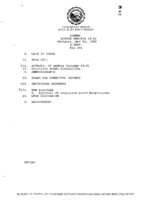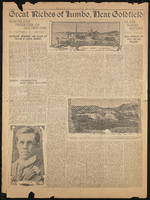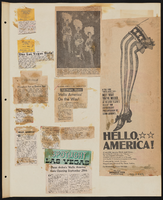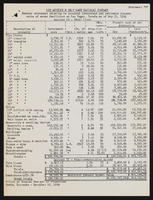Search the Special Collections and Archives Portal
Search Results
Fayle Family Papers
Identifier
Abstract
The Fayle Family Papers (1895-1998) document the family's personal and business interests in Goodsprings, Nevada and Las Vegas, Nevada. The collection contains mining documents, business records, and photographs from Leonard Fayle’s work with the Las Vegas Valley Water District, where he documented reservoirs, dams, and both abandoned and functioning mines. The photographs also include family members, vacations, and Southern Nevada fraternal organization pictures.
Archival Collection
John Wittwer Collection on Agriculture in Nevada
Identifier
Abstract
The John Wittwer Collection on Agriculture in Nevada (1898-1972) contains the professional papers and records of John Wittwer in his capacity as an Agricultural Extension agent for the University of Nevada from 1921 to 1954. The records are primarily annual reports containing text, photographs, newspaper clippings, and charts that provide a rich chronicle of the conditions of agriculture and ranching in southern Nevada from 1898 to 1972, with the bulk of the material dating from 1929 to 1955. These conditions span water issues, such as flood control and irrigation, to the general difficulties of sustaining agriculture and viable food production in a desert environment. The reports come from the Agricultural Experiment Stations in Clark and Lincoln counties and most contain both a statistical report and a narrative summary.
Archival Collection

Transcript of interview with Sandra Peña by Lada Mead and Stefani Evans, March 27, 2017
Date
Archival Collection
Description
Sandra Peña’s story begins in East Los Angeles, where she spent her first fifteen years with her parents (both from Michoacán, Mexico), and her younger sister. The father's managerial position at Master Products allowed the family to live rent-free in a company-owned house behind the main factory, because he collected the rents for the company's two other dwellings. In this interview, Peña recalls the family move to Porterville, in California's Central Valley, her return to Los Angeles at nineteen, and her work with Parson’s Dillingham, a contractor for the Metrolink rail system. She draws the link between the Los Angeles and Las Vegas construction communities by describing her husband's move to Las Vegas to find work; a chance Las Vegas encounter with a friend from Chino, California; her ability to gain employment in Las Vegas at Parson’s, a company that had joint ventured with Parson’s Dillingham, and her move from there to Richardson Construction, a local minority-owned company. As Peña says, "It's kind of all intermingled. Even if you go here and you go there, it's like everybody knows everybody." Throughout, Peña weaves her family story into the narrative as she describes her youth, the birth of her son, the illness and death of her father, and her family's participation in her current employment with Richardson. As she remembers the people, places, and events of her life, Peña speaks to the ways one woman of color built on her interstate construction connections and rose in a male-dominated industry.
Text
Mabel Hoggard Papers
Identifier
Abstract
The Mabel Hoggard Papers (1903-2011) contain materials related to Hoggard's career as a Las Vegas, Nevada elementary school teacher, her research and civic interests in Las Vegas's predominantly African American Westside communities, and her engagement with civil rights issues. The collection also contains materials about Hoggard's life, including biographical newspaper articles about her childhood, education, work, and family. The collection includes lesson plans, scrapbooks, awards, correspondence, photographs, and physical objects such as a vinyl record and political pins. The bulk of the collection focuses on her life in Las Vegas from approximately 1946-1989.
Archival Collection

Lily Teo oral history interview: transcript
Date
Archival Collection
Description
Oral history interview with Lily Teo conducted by Stefani Evans on February 7, 2022 for Reflections: The Las Vegas Asian American and Pacific Islander Oral History Project. Lily Teo discusses her upbringing in Singapore, her education, her religious beliefs, and converting from Buddhism to Catholicism. She talks about her husband, her early married years, and what life was like as a young mother of three children. Teo shares how she started a catering business to feed construction workers and was responsible for shopping for ingredients, preparing all meals and tea, and cooking the food on site in her temporary kitchen. She talks about her children, the faiths they practice and languages they speak including English, Malay, and Mandarin, and the customs and traditions they practice, such as celebrating Lunar New Year and other holidays. Lily's daughter, Stella, sits in on the interview and expands on her mother's recollections.
Text

Lupe Avelar oral history interview: transcript
Date
Archival Collection
Description
Oral history interview with Lupe Avelar conducted by Marcela Rodriguez-Campo and Maribel Estrada Calderón for the Latinx Voices of Southern Nevada Oral History Project. Lupe Avelar describes her life growing up in Durango, Mexico on a family farm and her immigration to New Mexico as a teen with her brother before returning back to Mexico. Lupe talks about her marriage to Eladio Avelar and how the couple eventually moved to California as well as her circumstances of moving to Las Vegas. Subjects discussed include: cotton fields; cotton farming.
Text

Meeting minutes for Consolidated Student Senate University of Nevada, Las Vegas, May 11, 1989
Date
Archival Collection
Description
Text



